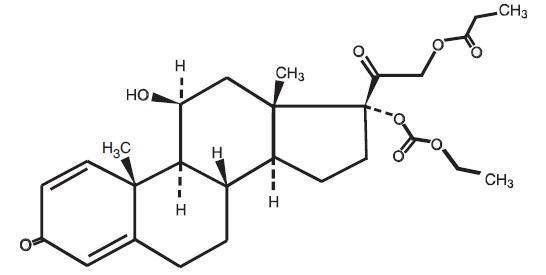Prednicarbate
Dosage form: emollient cream
Drug class:Topical steroids
Medically reviewed by Drugs.com. Last updated on Sep 21, 2021.
On This Page
FOR DERMATOLOGIC USE ONLY.
Rx only
NOT FOR USE IN EYES.
DESCRIPTION:
Prednicarbate cream 0.1% (emollient) contains Prednicarbate, a synthetic corticosteroid for topical dermatologic use. The chemical name of Prednicarbate is 11β, 17,21-trihydroxypregna-1,4-diene- 3,20-dione 17-(ethyl carbonate) 21-propionate. Prednicarbate has the empirical formula C27H36O8 and a molecular weight of 488.58. Topical corticosteroids constitute a class of primarily synthetic steroids used topically as anti-inflammatory and antipruritic agents. The CAS Registry Number is 73771-04-7.
The chemical structure is:
Prednicarbate is a practically odorless white to yellow-white powder insoluble to practically insoluble in water and freely soluble in ethanol.
Each gram of Prednicarbate cream 0.1% (emollient) contains 1.0 mg of Prednicarbate in a base consisting of white petrolatum, purified water, isopropyl myristate, lanolin alcohols, mineral oil, cetostearyl alcohol, aluminum stearate, edetate disodium, lactic acid, and magnesium stearate.
CLINICAL PHARMACOLOGY:
In common with other topical corticosteroids, Prednicarbate has anti-inflammatory, antipruritic, and vasoconstrictive properties. In general, the mechanism of the anti-inflammatory activity of topical steroids is unclear. However, corticosteroids are thought to act by the induction of phospholipase A2 inhibitory proteins, collectively called lipocortins. It is postulated that these proteins control the biosynthesis of potent mediators of inflammation such as prostaglandins and leukotrienes by inhibiting the release of their common precursor arachidonic acid. Arachidonic acid is released from membrane phospholipids by phospholipase A2.
Pharmacokinetics: The extent of percutaneous absorption of topical corticosteroids is determined by many factors, including the vehicle and the integrity of the epidermal barrier. Use of occlusive dressings with hydrocortisone for up to 24 hours have not been shown to increase penetration; ho...




